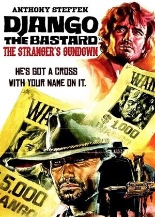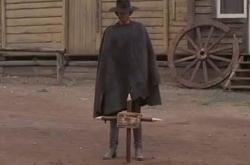
 In all the dusty annals of the mythical Western genre, if there was ever a true bastard to tame the Wild West, it was apparently Django or, even better, Django the Bastard, this illicit Italian rip-off of his blood-spattering name.
In all the dusty annals of the mythical Western genre, if there was ever a true bastard to tame the Wild West, it was apparently Django or, even better, Django the Bastard, this illicit Italian rip-off of his blood-spattering name.
People are strange when you’re the Stranger, a gunslinger dressed in black (the decided un-Franco Nero Anthony Steffen) who walks into town one day carrying a convenient wooden cross; he plants it dead in the middle of the town square and quickly doles out his six-shooter justice, the only way a black-hearted demon from hell — as we’re told he might be — can.
Meanwhile, the just-as-terrible townsfolk are placing wagers on a game where two poor boys toss a stick of dynamite back and forth, betting dollars on who is going to get a hand blown off first. Welcome to Desert City, population … well, I guess it doesn’t matter, because Django’s got a handmade wooden cross for all of them, which he hands out one by one.
 Turns out that this low-rent incarnation of Django isn’t an avenging angel, but rather a former soldier who is seeking revenge on the perpetrators of a brutal Confederate massacre, one that apparently he can’t seem to get over; he crafted this death-bringer persona as way to not only strike fear in the hearts of fellow evildoers, but also to help him through the apparent post-traumatic stress that he is surely going through.
Turns out that this low-rent incarnation of Django isn’t an avenging angel, but rather a former soldier who is seeking revenge on the perpetrators of a brutal Confederate massacre, one that apparently he can’t seem to get over; he crafted this death-bringer persona as way to not only strike fear in the hearts of fellow evildoers, but also to help him through the apparent post-traumatic stress that he is surely going through.
Whatever works, I suppose.
Filmed at a tumultuous time in spaghetti cinema when the men looked like glam-rock refugees and the women like young Melania Trumps, Django the Bastard was originally released under the more family-friendly title of The Strangers Gundown — and it’s gundowns a-plenty that Django delivers in this mostly watchable tale of brutal revenge and copyright infringement. —Louis Fowler
